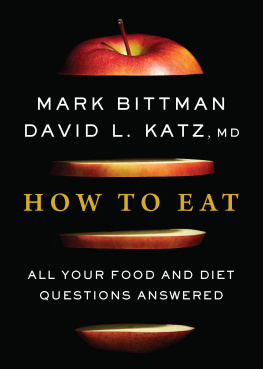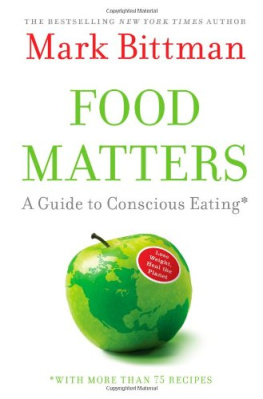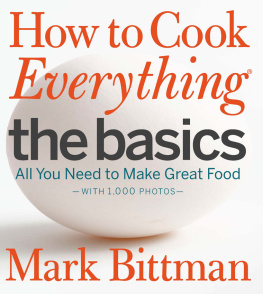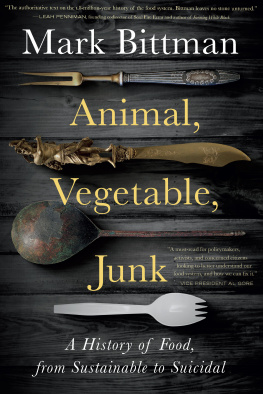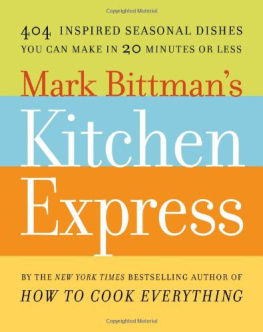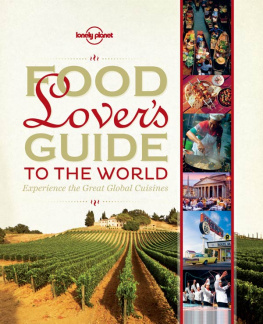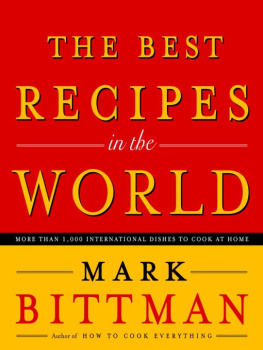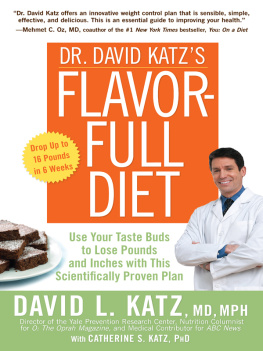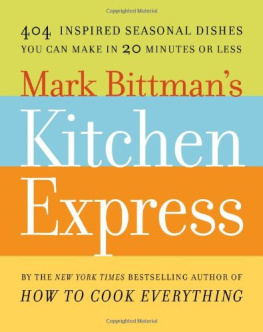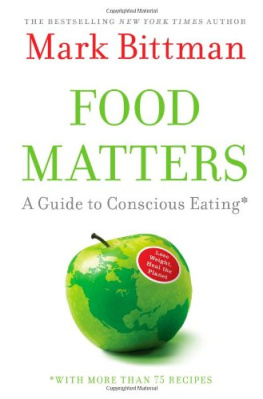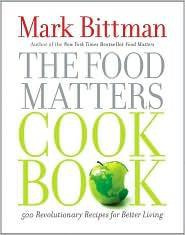Copyright 2020 by Mark Bittman and David L. Katz
All rights reserved
For information about permission to reproduce selections from this book, write to or to Permissions, Houghton Mifflin Harcourt Publishing Company, 3 Park Avenue, 19th Floor, New York, New York 10016.
hmhbooks.com
Library of Congress Cataloging-in-Publication Data
Names: Bittman, Mark, author. | Katz, David L., 1963 author.
Title: How to eat : all your food and diet questions answered / Mark Bittman, David L. Katz, MD.
Description: Boston : Houghton Mifflin Harcourt, 2020. | Includes bibliographical references and index.
Identifiers: LCCN 2019049816 (print) | LCCN 2019049817 (ebook) | ISBN 9780358128823 (hardback) | ISBN 9780358129493 (ebook)
Subjects: LCSH: NutritionMiscellanea. | DietMiscellanea.
Classification: LCC TX355 .B5835 2020 (print) | LCC TX355 (ebook) | DDC 613.2dc23
LC record available at https://lccn.loc.gov/2019049816
LC ebook record available at https://lccn.loc.gov/2019049817
Cover design by Alex Merto
Cover photography Plamen Petkov
v2.0220
Introduction
Science, Sense, and Mashed Banana
Lets say you feel like eating a banana. Youd likely peel it first.
You might have the worlds most powerful food processor at your disposal, but that would not help you peel your banana any better. You might have an even more powerful chainsaw in your garage, or a table saw. But these wouldnt help either.
You know that using any of these would be ridiculous. However state-of-the-art each tool might be, however representative of the prowess of the applied science of engineering, none would enhance your native banana-peeling capacity. In fact, each would leave you with a mangled mess to clean up where once had been your banana.
Science is a set of power tools. Used well, the tools of science (which, of course, is the incubator of all other power tools) extend human ability and perception. With a microscope, a telescope, or a Gauss meter, science can reveal what was previously too small, too distant, or, in the case of an electromagnetic field, imperceptible. Science enables us to see the invisible, hear the inaudible, discern the elusive, and understand the otherwise inscrutable.
But science is not only about power tools, and one of the great misdirections in modern nutrition is the contention that to derive truth and understanding you must always only use a particular power tool, a special kind of scientific study, and that without this kind of study nothing can be understood. Our response to that is: nonsense.
To be clear, we are both disciples of science. One of us (David) has made a career of it, running a research lab, conducting and publishing randomized trials, systematic reviews, and meta-analyses, and even inventing methods of evidence synthesismethods for reaching conclusions about the weight of evidence on a given topicalong the way. The other (Mark) became entranced by science as a boy, but chose another direction, one that routinely relies on science as a source of understanding.
But we are equally adamant defenders of sense. Science without sense is the chainsaw approach to peeling a banana. You dont always need a power tool. Sometimes its not only superfluous but potentially harmful. We dont need studies to tell us how to peel a banana, or that an apple thrown into the air will come back down, or even that the apple is a good thing to eat.
The artful (or at least competent!) blend of science and sense is what we believe to be our signature contribution, the approach that sets How to Eat apart from the literally hundreds of nutrition books out there. Throughout this book, we invoke sense to interpret science. We rely on sense to discern the readily observable. We employ sense to assess the relevance of science. Science may be the best means ever devised to answer hard questions, but only sense can determine whether you are asking a valid, useful question in the first place, and sense can inform whether science is needed, and if so, what kind, to answer that question.
We each know all we need to know about how to eat for pleasure. We know much about how to eat for health and sustainability from experience and observation, too, and far more from science of every description, from basic science to intervention trials and observational epidemiology in large cohorts and even whole populations.
We increase our knowledge, and can rely on it even more, when we accumulate evidence and use its weight to make judgments, rather thanas the 24-hour news cycle encourages us toby tilting with every new study, believing that a new finding somehow sets the world off kilter.
We know most and know it best when all sources of genuine insight are conjoined. Sense plus science.
Any given research method is just one kind of tool. Used well, it can help build the bridge to truth and construct understanding. Used badly, it will just mangle your banana. The insistence that nothing is true unless and until its confirmed by a randomized controlled trial is not only wrongand you dont need to be a scientist to realize this, nor should you let a scientist convince you otherwisebut is often used by people with ulterior motives who seek to profit by our confusion. We could design a trial, for example, that would conclude that overeating sugar is better than overeating fator vice versaand yet sense tells everyone that overeating either is not a good thing.
Ultimately, we really just want to know what is true; we want to understand. We expect you do, too, and using science and sense, we attempt here to tell it like it is, and we tell you how we know how it is. And when we arent sure, we tell you that; not everything is known. Both science and sense leave room for doubt, and often require it.
But beyond the shadow of all doubt, and resting securely on a foundation of both science and sense, is a sufficient understanding of how to eat to massively reduce your risk of all major chronic disease and premature death. We have, and can give you, the understanding necessary to add years to your life and life to your years, and to help save our existence on this planet.
No, we dont know everything. But we know enough. Science, through the filter of sense, reveals more than enough reliable truth about how to eat to do a literal world of good.
DK/MB
QUESTIONING THE QUESTIONS
(Why Do We Even Need to Ask How to Eat?)
How Did We Get Here?
Shouldnt how to eat be clear already?
In a way, it is. Every animal knows how to eat, and only in humans (and the animals under their control) has this been perverted. In the last century or so, weve been led astray. And were so far from our origins that its proving hard to find our way back.
Yet theres nothing more important: Food is the fuel that runs every function of the complex human machine. It is the source of construction material for the growing bodies of children and all the replacements adult bodies require on a daily basis. What we eat is crucial to the integrity of the nervous system, the balance of hormones, the function of our blood vessels, the responses of the immune system. If there were one thing wed say, its this: You dont want to eat non-food. Period. But well get back to that.
Take me back to a time before mass food production.
Close your eyes and try to imagine: Nearly every culture since the dawn of agriculture relied on grains as the foundation of their diet; they were (and are) inexpensive because they were (and are) easy to grow in quantity.
Everyone ate mostly... what?
Virtually everyone ate grains: rice, wheat, corn, millet, depending on the region. Grains were staples. In some places, the aristocracy ate delicacies.

